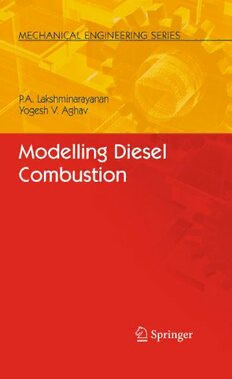Download Modelling Diesel Combustion PDF Free - Full Version
Download Modelling Diesel Combustion by P. A. Lakshminarayanan, Yoghesh V. Aghav (auth.) in PDF format completely FREE. No registration required, no payment needed. Get instant access to this valuable resource on PDFdrive.to!
About Modelling Diesel Combustion
The diesel engine is the most efficient combustion engine today and it plays an important role in transport of goods and passengers by land and sea. However, the emissions must be controlled without sacrificing the legendary fuel economy of the diesel engines. These important drivers have caused innovations in diesel engineering like re-entrant combustion chambers in the piston, lower swirl support and high pressure injection, in turn reducing the ignition delay and hence the nitric oxides. This book is a detailed discussion of diesel combustion phenomena like ignition delay, fuel air mixing, rate of heat release, and emissions of smoke, particulate and nitric oxide. It enables quantitative evaluation of these important phenomena and parameters. Most importantly, it attempts to model them with constants that are independent of engine types. This work recognises the importance of the spray at the wall in precisely describing the heat release and emissions for most of the engines on and off road. It gives models for heat release and emissions. Every model is thoroughly validated by detailed experiments using a broad range of engines. Throughout the book, the models use constants that are independent of engine type or design and hence they could be applied by the designer and researcher for a general engine. All the models not only describe the trends of important parameters but also quantitatively close to the experimentally observed results. The enhanced understanding of the phenomena like turbulent flows, high-pressure sprays naturally converges to quantitative prediction using multi-dimensional CFD tools to reveal finer details of in-cylinder processes of diesel combustion. The CFD tools are introduced with case studies in two chapters of the book to help study innovative combustion concepts and improve engine designs in terms of emissions reduction and fuel economy.
Detailed Information
| Author: | P. A. Lakshminarayanan, Yoghesh V. Aghav (auth.) |
|---|---|
| Publication Year: | 2010 |
| ISBN: | 9789048138845 |
| Pages: | 313 |
| Language: | English |
| File Size: | 8.054 |
| Format: | |
| Price: | FREE |
Safe & Secure Download - No registration required
Why Choose PDFdrive for Your Free Modelling Diesel Combustion Download?
- 100% Free: No hidden fees or subscriptions required for one book every day.
- No Registration: Immediate access is available without creating accounts for one book every day.
- Safe and Secure: Clean downloads without malware or viruses
- Multiple Formats: PDF, MOBI, Mpub,... optimized for all devices
- Educational Resource: Supporting knowledge sharing and learning
Frequently Asked Questions
Is it really free to download Modelling Diesel Combustion PDF?
Yes, on https://PDFdrive.to you can download Modelling Diesel Combustion by P. A. Lakshminarayanan, Yoghesh V. Aghav (auth.) completely free. We don't require any payment, subscription, or registration to access this PDF file. For 3 books every day.
How can I read Modelling Diesel Combustion on my mobile device?
After downloading Modelling Diesel Combustion PDF, you can open it with any PDF reader app on your phone or tablet. We recommend using Adobe Acrobat Reader, Apple Books, or Google Play Books for the best reading experience.
Is this the full version of Modelling Diesel Combustion?
Yes, this is the complete PDF version of Modelling Diesel Combustion by P. A. Lakshminarayanan, Yoghesh V. Aghav (auth.). You will be able to read the entire content as in the printed version without missing any pages.
Is it legal to download Modelling Diesel Combustion PDF for free?
https://PDFdrive.to provides links to free educational resources available online. We do not store any files on our servers. Please be aware of copyright laws in your country before downloading.
The materials shared are intended for research, educational, and personal use in accordance with fair use principles.

